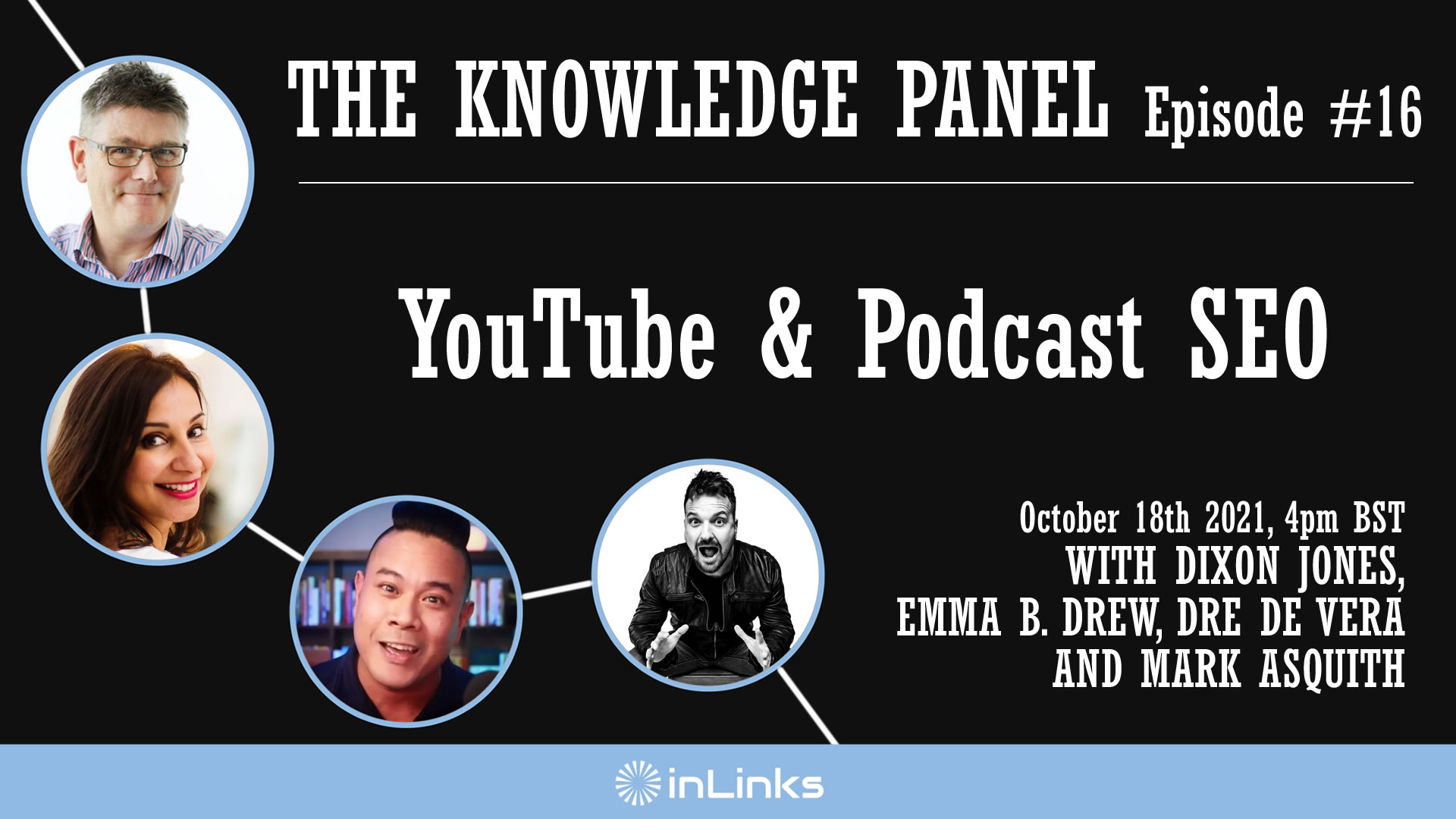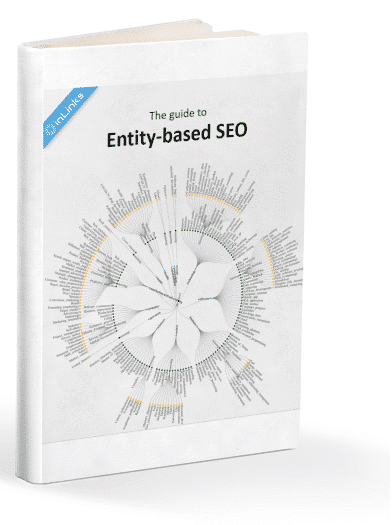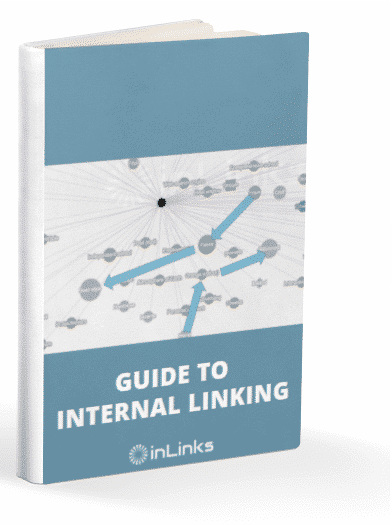Is obtaining organic YouTube and podcast success very different to conventional SEO for Google? How do you SEO for YouTube and podcasting and are there tactics and principles used in optimizing video and audio that would also be applied to traditional SEO? That’s what we’re going to be discussing on episode 16 of the Knowledge Panel. Joining your host Dixon Jones is Emma Drew from Online Media Biz, Dre de Vera from the SEO Video Show and Mark Asquith from Captivate.

Sign up below to watch future episodes live…
Want to Read Instead? Here is a Summary
Hello, everyone! Welcome to another episode of the Knowledge Panel. In today’s episode, we dive into the world of SEO strategies for YouTube and podcasts, along with valuable insights into effective promotion techniques. Our panel of experts discusses the nuances of optimizing content for better visibility and engagement. Let’s meet our expert guests:
Emma Drew: Founder of Online Media Biz, a YouTube consultant with a thriving YouTube channel ‘MyVox Songs,’ boasting nearly 440 million views.
Dre (Paul Andrew Devera): Host of ‘The SEO Video Show’ on YouTube, renowned for curating SEO videos into one-minute clips and sharing expert insights.
Mark Asquith: Founder of Captivate, a podcast distribution, syndication, and monetization platform that empowers independent creators worldwide.
In this insightful transcript, podcasting experts Dre, Emma Drew, and Mark Asquith share their thoughts on podcast promotion, SEO, consistency, and more. The conversation delves into various aspects of podcasting, from the frequency of releases to effective promotion strategies. If you’re a podcast creator or enthusiast, this conversation offers valuable insights.
When it comes to podcasting, there’s more to it than just recording episodes and hitting publish. A panel of podcasting experts recently discussed the importance of consistency, promotion strategies, and the role of SEO in the podcasting world.
Introductions and Insights
The panel kicks off with introductions, highlighting their backgrounds and expertise in the digital realm. Emma Drew, a successful YouTuber, shares her journey from content creation to coaching. Dre, known for his SEO-centric content, emphasizes the significance of keyword research for ranking on search engines like Google and YouTube. Mark provides insights into podcast analytics and the challenges of measuring performance across diverse platforms.
Long-Form vs. Short-Form Content
A key topic of discussion is the debate between long-form and short-form content. Emma reflects on her experience with both animated short videos and longer podcasts, revealing the need to tailor content to audience preferences. Dre, who specializes in shorter SEO-related content, highlights the importance of long-tail keywords for answering user queries effectively. Mark delves into the unique opportunities that podcasting offers, explaining how platforms like Spotify and Apple Podcasts analyze content for relevant information.
Optimizing Content for Visibility
The conversation transitions to optimizing content for better visibility. Emma advises strategically incorporating keywords into titles, descriptions, and tags, with a focus on front-loading titles for maximum impact. Dre echoes the sentiment, emphasizing thorough keyword research and leveraging existing ranking videos. Mark emphasizes that podcast titles, episode titles, and author tags are key ranking factors, urging creators to focus on high-quality, relevant content.
Promotion and Analytics Challenges
Addressing the challenge of promoting content and tracking analytics, the panel shares valuable insights. Emma discusses the process of breaking down podcasts into digestible segments, optimizing descriptions, and leveraging timestamps for enhanced user experience. Dre sheds light on the power of chaptering, with platforms like YouTube and Google utilizing this feature to enhance user engagement. Mark discusses the complexity of tracking performance across various platforms, providing strategies to create attribution links for better measurement.
Owning Your Content Journey
As the conversation winds down, the panel emphasizes the importance of owning the content journey. From naming the show to structuring episodes, each expert highlights the significance of creating a cohesive brand identity. Mark suggests that owning the show name and leveraging your unique niche can provide a competitive edge, especially as the podcasting landscape evolves.
Market Share and Discovery
One interesting topic that emerged was the issue of market share and where listeners are discovering podcasts. The panel noted that while Google’s market share for podcast discovery might not be as dominant as in other areas, platforms like Spotify and Apple Podcasts are the go-to sources for many listeners. However, the question remains: where are people really looking for podcasts? This led to a discussion about the importance of understanding listener behavior and optimizing content accordingly.
Frequency and Consistency
The panel agreed that podcast consistency is key. Having a regular schedule for releasing episodes helps build audience expectations and engagement. Dre emphasized his daily posting schedule, while Emma Drew explained her transition from a more frequent release schedule to a focus on creating valuable long-form content once a month. Mark Asquith pointed out that, in podcasting, measuring the right metrics is crucial. While many focus on monthly download numbers, what really matters is consistency and engagement.
Promotion Strategies
The topic of promotion strategies generated insightful discussions. Emma Drew talked about her experience promoting her podcasts through YouTube, leveraging her established audience to drive traffic to her podcast. Dre shared his approach of promoting his videos on platforms like Facebook to create initial buzz and attract organic engagement.
SEO and Discoverability
Search Engine Optimization (SEO) is not only relevant to websites but also plays a significant role in podcast discoverability. Mark Asquith highlighted the importance of consistency in your podcast title and description to improve visibility in search results. Emma Drew emphasized the value of clear and engaging episode titles to capture the audience’s attention quickly.
Paid Promotion
Paid promotion was also discussed, with panelists sharing mixed experiences. While there is potential in promoting podcast episodes through platforms like Facebook, the consensus was that cross-promotion within the podcasting community is often more effective. Building relationships with other podcasters and featuring each other’s content can lead to better growth and engagement.
Voice Search and Future Trends
The conversation shifted towards voice search and its role in podcast discovery. With smart devices like Alexa and Google Home becoming more popular, optimizing for voice search is a consideration for the future. Panelists discussed the challenges and opportunities this presents, with the consensus that voice search will likely play a significant role in podcast discovery moving forward.
Final Thoughts
The panel concluded with an emphasis on understanding listener behavior and consistently delivering high-quality content. Whether it’s promoting episodes, leveraging SEO, or staying ahead of trends like voice search, the key takeaway is to continually adapt and evolve to meet the needs of your audience.
Podcasting isn’t just about recording and uploading—it’s a multifaceted journey that requires strategy, consistency, and a deep understanding of your audience’s preferences. As the podcasting landscape continues to evolve, these insights can guide creators towards better engagement and growth.





Leave a Reply
Want to join the discussion?Feel free to contribute!